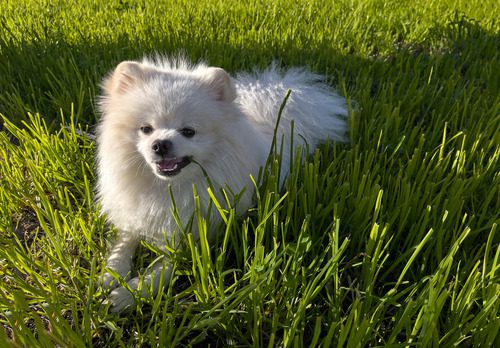Why Do Dogs Eat Grass?

Many dog owners have seen their pup munching on grass and wondered what it means. Is it a sign of illness, boredom, or something else entirely? If your dog occasionally snacks on your lawn, you’re not alone and you’re not necessarily facing a serious health concern. The behavior is surprisingly common and often harmless. In this blog, we’ll explore the possible reasons behind grass-eating, when it might be a red flag, and how Yalesville Veterinary Hospital in Yalesville, CT can help if the habit becomes excessive or concerning. Keep reading to get a better understanding of this puzzling dog behavior.
Natural Instinct or Curious Habit?
Dogs explore the world with their mouths. Just like sniffing every lamppost or rolling in leaves, chewing on grass can be part of that exploration. Some behaviorists believe eating grass is a natural instinct inherited from wild ancestors, who consumed entire prey, animals’ stomach contents and all, which may have included plant material. Over time, the behavior may have stuck around, even as dogs became domesticated and their diets changed. Grass might also provide a texture or flavor that your dog simply enjoys. While it’s not considered a nutrient-rich snack, dogs may still seek out certain types of grass that appeal to them. Occasional grass eating may have no deeper meaning than preference or curiosity.
Could Grass Eating Signal an Upset Stomach?
One of the most common theories behind grass-eating is that dogs do it to induce vomiting. Some pet owners report that their dog eats grass quickly and then vomits shortly afterward. This has led to the belief that dogs instinctively turn to grass when they feel nauseous or gassy.
Cause or Effect?
It’s unclear whether grass actually causes dogs to vomit or whether they seek it out because they already feel sick. Studies have shown that most dogs who eat grass do not throw up afterward, which complicates this theory. It’s possible that only certain dogs eat grass when they feel ill, while others eat it for different reasons altogether.
When to Monitor This Behavior
If your dog is eating grass frequently and vomiting often, that’s a reason to contact your veterinarian. While an occasional episode is typically not concerning, repeated vomiting can indicate an underlying issue that needs professional evaluation. Yalesville Veterinary Hospital is here to help if you’re noticing a pattern in your dog’s behavior. Call us at (203) 265-1646 or book an appointment online today.
Is Something Missing from Their Diet?
Some experts suggest that dogs may eat grass because they are lacking certain nutrients or fiber in their diet. However, there’s limited scientific evidence to support this idea. Most dogs today are fed balanced commercial diets that meet their nutritional needs.
The Fiber Connection
In some cases, dogs may instinctively look for extra roughage. Grass contains fiber, which may aid digestion or help move stool through the system. If your dog is eating grass regularly and also having irregular bowel movements, it may be worth reviewing their diet with your vet. Adding fiber through food (rather than grass) is a safer option if that’s the goal. Your veterinary team can recommend a suitable food formula or supplement tailored to your dog’s digestive needs.
Boredom, Anxiety, or Behavioral Factors
Like many repetitive behaviors in dogs, grass eating can sometimes be linked to emotional or mental triggers. Dogs left alone for long periods, or who lack stimulation, might turn to grass eating as a way to pass time or relieve stress.
Identifying Behavior-Driven Eating
If your dog tends to eat grass during specific situations such as during a walk, in the backyard alone, or when you’re not home, pay attention to those patterns. Environmental cues can offer clues as to whether the behavior is emotionally driven.
How to Address It
Mental stimulation, more frequent walks, playtime, or training sessions can redirect your dog’s focus. Interactive toys, puzzle feeders, or scent games can all reduce boredom and prevent your dog from developing habits like grass eating. Your veterinary team can also refer you to a trainer or behaviorist if the issue seems persistent.
When Should You Be Concerned?
Most dogs that eat grass occasionally don’t require treatment or behavior modification. However, there are certain situations where grass eating might point to a larger concern.
Red Flags to Watch For
- Vomiting frequently after eating grass
- Signs of lethargy, decreased appetite, or diarrhea
- Sudden increase in grass consumption
- Refusal to eat their normal food while still eating grass
- Ingesting other non-food items (pica)
If your dog’s grass-eating behavior has changed suddenly or seems excessive, it’s time to talk with your veterinarian. A full physical exam and diagnostics may be necessary to rule out gastrointestinal issues, anxiety, or nutritional imbalances.
Call Yalesville Veterinary Hospital
Your dog’s behavior can offer valuable insights into their health. If you’re unsure whether your dog’s grass eating is cause for concern, give us a call at (203) 265-1646 or schedule an appointment online. We’re happy to assess your dog and answer any questions you have.
Is Grass Itself Dangerous for Dogs?
Most common lawn grasses aren’t harmful to dogs, but that doesn’t mean eating grass is completely risk-free. The real concern lies in what might be on the grass rather than the grass itself.
Potential Hazards to Be Aware Of
- Pesticides and fertilizers: Chemicals used to treat lawns can be harmful if ingested.
- Weed killers: Even dried residues can pose a risk to pets.
- Parasites: Grass can harbor intestinal parasite eggs and larvae, especially in high-traffic areas.
- Foreign objects: Sharp twigs, sticks, or debris can get mixed in with the grass and cause injuries.
If your dog eats grass during walks, try to guide them away from treated or unfamiliar areas. At home, consider pet-safe lawn care options and always monitor their behavior while outdoors.
What If It’s Just a Quirk?
For many dogs, grass eating is a harmless habit that doesn’t signal any health problems. It may simply be part of their personality. Some dogs nibble only when the grass is fresh and wet. Others seem to enjoy tearing it out and spitting it aside without even swallowing. As long as your dog isn’t vomiting frequently, showing signs of distress, or ingesting toxic substances, this behavior often doesn’t need to be corrected. Still, if you ever have doubts, your veterinary team is your best resource for peace of mind.
Supporting Your Dog’s Health at Every Step
Whether your dog is eating grass for fun, flavor, or another reason entirely, paying attention to their habits helps you stay connected to their well-being. While most grass-eating behavior is normal and harmless, it’s always a good idea to stay informed and observe any changes.
Yalesville Veterinary Hospital is here to support you with expert care, honest answers, and personalized recommendations based on your dog’s needs. If your dog’s behavior seems out of the ordinary, call us today at (203) 265-1646 or book an appointment online. We’re proud to serve pets and their families throughout Yalesville and the surrounding communities.
